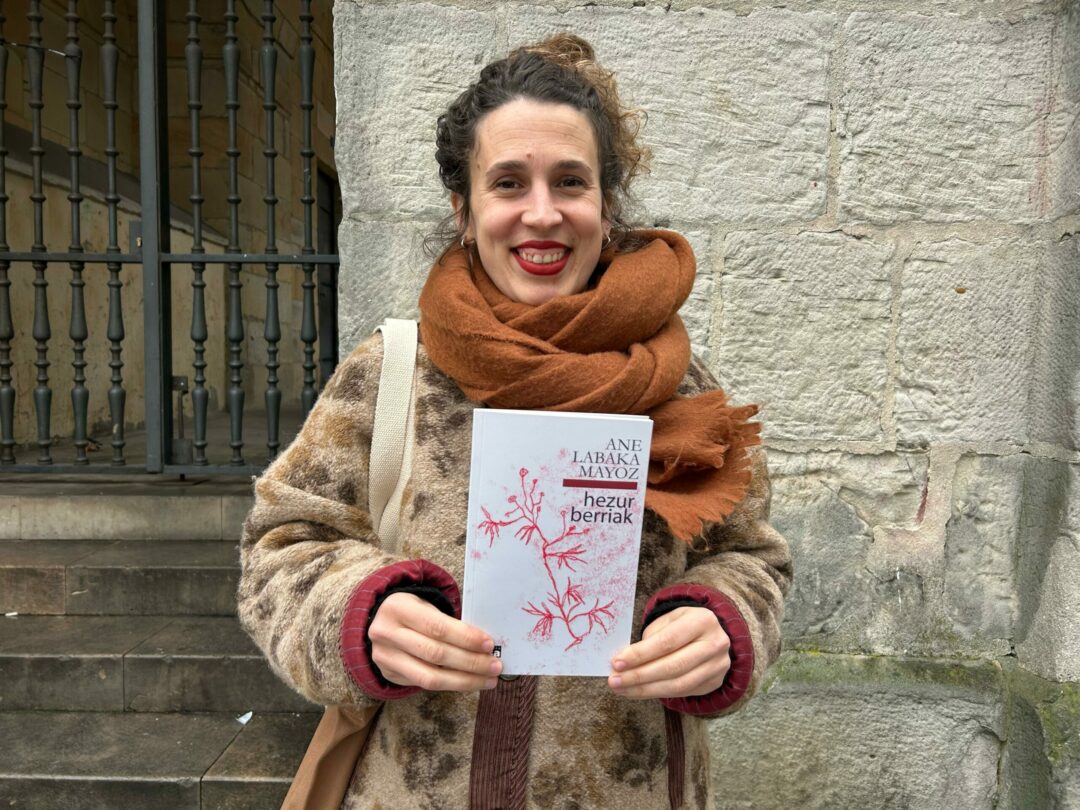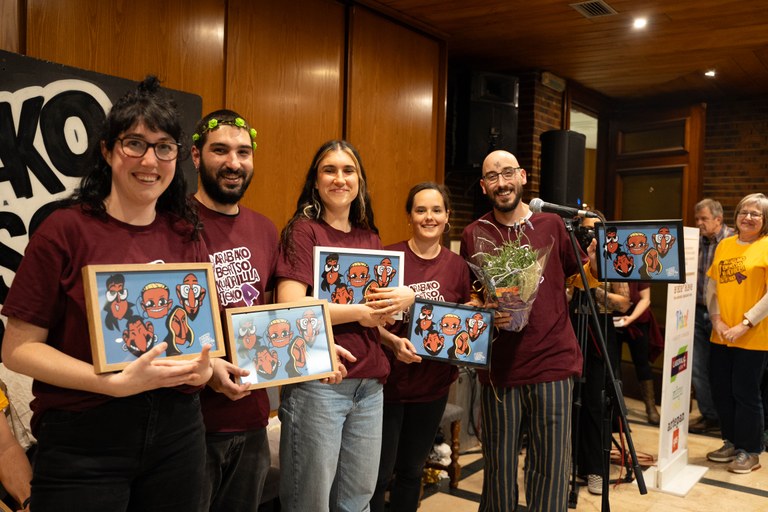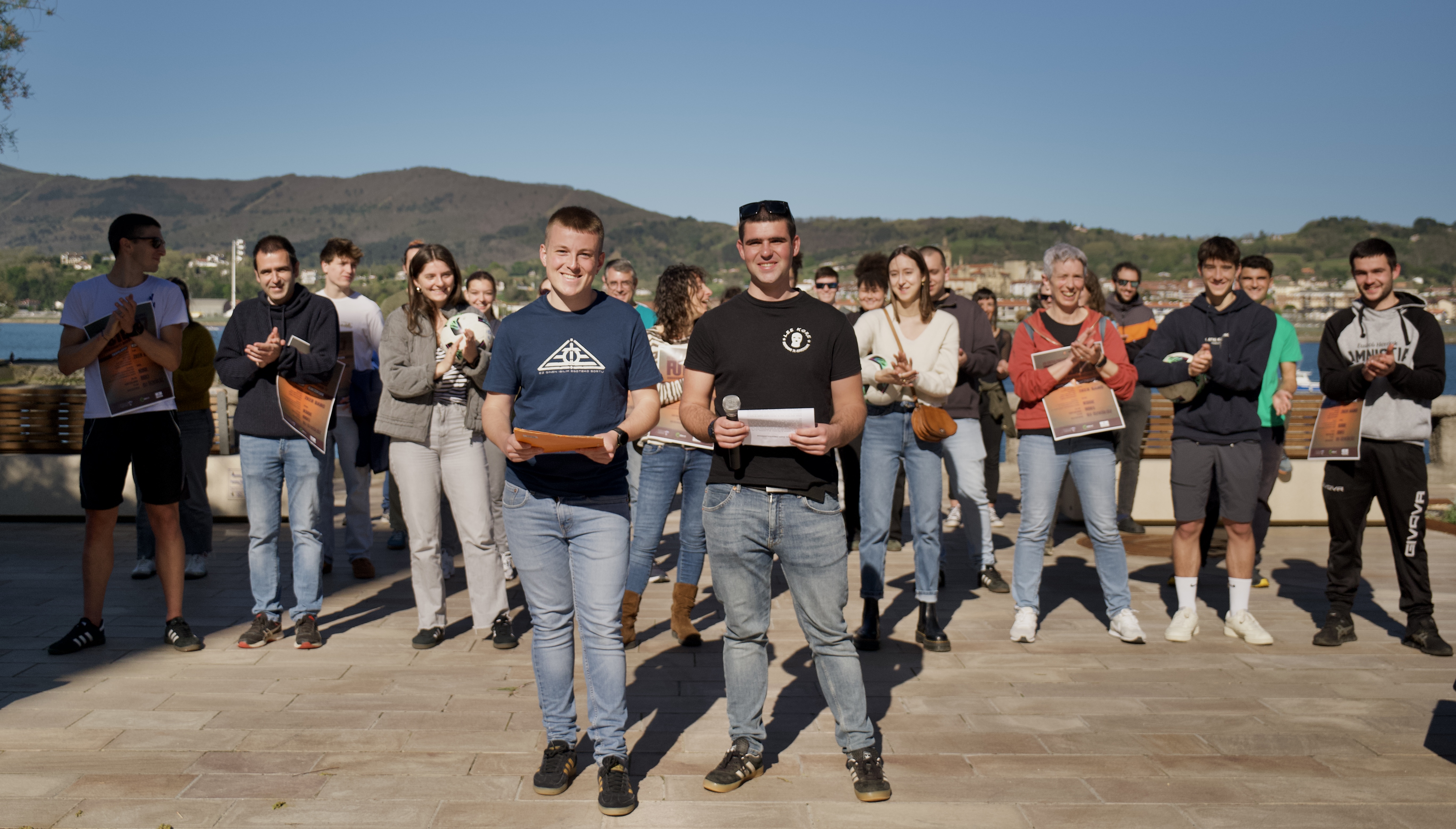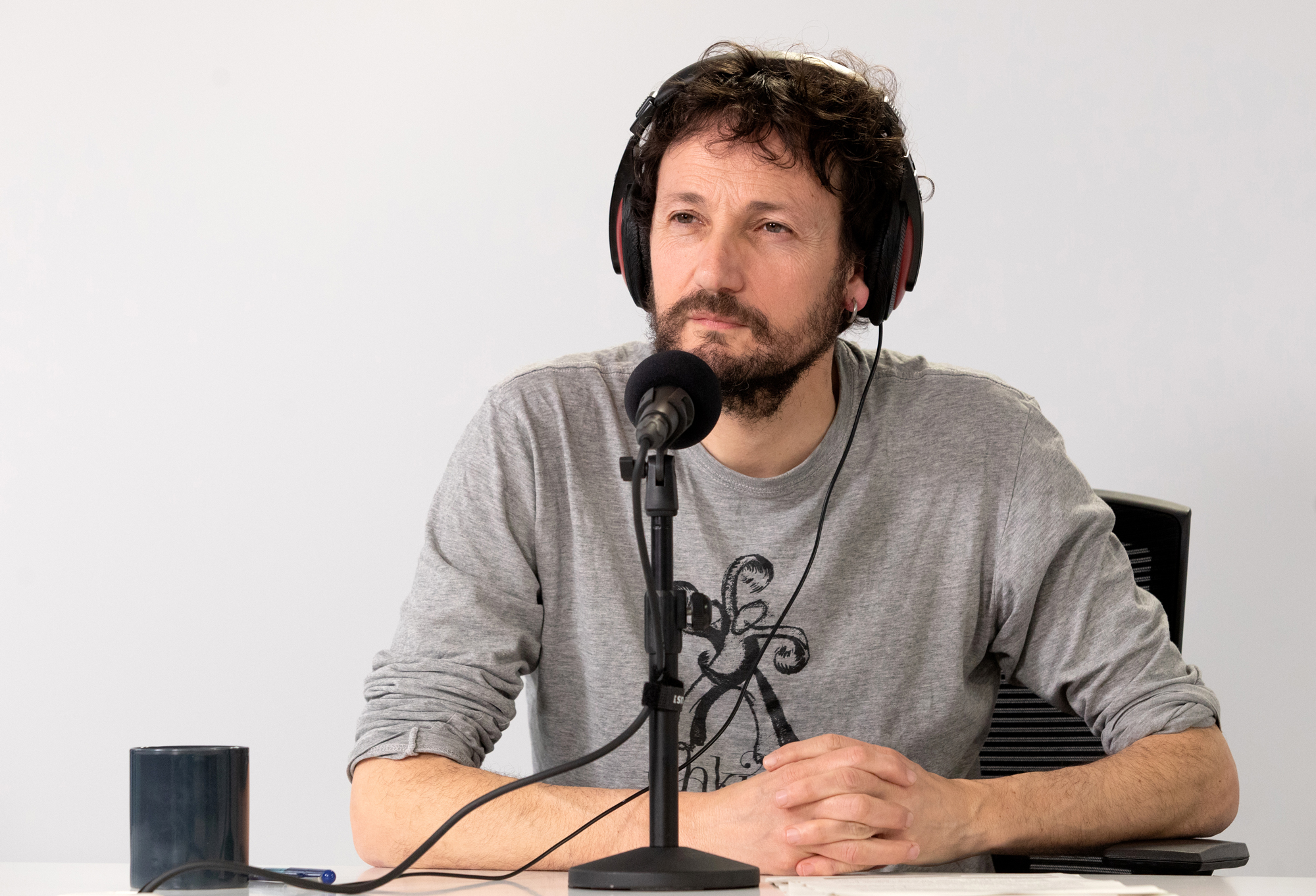"In general, we have the image of our culture of Japanese tourists"
- In the game of coexistence, and we in the bertsos...

“Nobody told me how difficult it is to be Basque,” Ruper sings.
Being Basque, like being left-wing or feminist, is difficult. We are in a subordinate and minority situation and we live in a counterculture, in constant counterculture. We fight for something that was lost, and we would like to be, in a personal struggle, in a collective struggle, in a struggle from the depths. It is an identity struggle in which personal options or identities do not exist if it is not within a collective identity. That is why it is difficult to be Basque. That is why, and because the minority language can only be given in a minority people. But tiredness is not bad. Having a space to fight is a great opportunity in life, and you have to fight because you have to fight, not necessarily to win. That doesn't mean that we have ambition and don't have to go win. That struggle of Vasquism that is continually piling us with the world and that we carry behind us is not a heavy backpack for me, but a treasure. My goal is to convey that treasure, and I want it to be a struggle that allows me to have a good time and gain knowledge, as well as a more orderly, just and dignified attitude towards the world. A difficult battle, but at the same time beautiful.
How to channel, however, the frustrations generated by the desire and the impossibility of living in Euskera in daily life?
We have a lot of work to equip ourselves and build the discourse and to clothe others. Are we Basques? Yes, we have the Basque, so we are Euskaldunes. Do we want our sons and daughters to be Euskaldunes? Where should we go so that they have that opportunity? We can say that being Basque is our way of being in the world, of being like him before a speaker of any language in the world. On the other hand, we can claim that we want culture and that culture is not just a language, but a people or people who are grouped under the concept of a nation in that language and culture. We have to be clear about how this is done. We have to be clear about the red lines that mark the sociolinguistics and ecology of languages in order to kill or make a language live. If you want to make a language live, you need to create hegemonic spaces, offer spaces in which he rules. That is what we have to believe and make others believe. Yes, if this place does not speak Basque, it will lose the Basque. What about speaking in Spanish? Yes, by doing here in Spanish the Basque will be lost, because the other languages will eat it. In this sense, why do I want all those who are not Euskaldunes to talk to me in Basque? What do I mean to a tabernacle that does not know Euskera when I ask for a drink in Euskera? What do you understand? That is what we must reflect. If it is to make a difference, I am from here and you are not, it may not serve us. If it is to underline the need to understand it, it may not serve us. When I turn to someone in Euskera, it's because I want to be part of my linguistic community, I'm inviting him.
Is it only the Basques that make up our linguistic community?
Although the definition of a member of the linguistic community is very evident in other linguistic communities, in ours it is a term that moves in time and space. I agree with Joxe Azurmendi when he says that our linguistic community is formed by Euskaldunes and anyone who is concerned about the destiny of Euskera. These people have no language but are aware that their descendant is Euskaldun. What about those who have language and don't have consciousness? They have to be asked or taught the same thing. To be Basque, consciously or unconsciously, is to put into practice a conscience. We must draw attention to those who have not yet realised it, so that they maintain a more active, real, sincere and sincere attitude towards themselves in the use of the Basque Country. Let them know that those who do not know are also by our side through consciousness, that they want to come by our side, and that those of us who have the language have to be aware of opening it to others.
I've read here and there that consciousness, outdated, is stunned.
Consciousness and militancy aren't fashionable, but I'm interested in that. Making a parallelism, you become aware of being a woman, it is not a matter of aesthetics, but of attitude towards life that develops in the face of harsh situations. This opens the door for you to immerse yourself in an ideology or thought that leads you to think that you have to give an emancipation battle from you. In a similar way, I see the Basque issue. How long are we going to believe that we live in the realm of individual rights? Is the group, language, human relations, justice worthless and everything is “I have my rights and am free in this free and consumerist market”? That is absolutely false. OK, individualism is absolutely necessary, feminism also owes its struggle to individualism, but that doesn't mean that collectivity is useless, that ideology is useless. In creating this consumerist reality, have we not been pedagogically opened up with an ideology to make us believe that we were hyper-individual and that we could not work as a group? That is absolutely false.
Otherwise, there would be no strike, no demonstration for prisoners, no feminism, no linguistic struggle, nothing. Consumerism has no other objective than to devour all ideologies, to turn them into aesthetic purees and to sell them, but in the socio-economic times we live, who dares to say that it has achieved it? The ideologies are said to have died, but isn't the right? I believe that, by force, we are returning to ideological times.
It is an ideological decision that the Council of Gipuzkoa should carry out its foreign activity only in Basque. Why is it considered “imposition” to be done in Basque and to act in Spanish “as a democratic decision that makes us more mundane”?
We are not for ourselves, but for others. Others tell us what we are. Among other things, the hegemonic group decides, the way to speak, the agenda ... As she has all the information in her hand, she decides whether it's a tree or a plant, and she also defines subordinate groups. With the Basque, the hegemonic powers in the area decide what the Basque is, how it is, and tolerate a place that does not disturb anyone in their democratic, universal and wonderful world. In the end, we end up believing that we are small, partial, particular, that the Basque country only serves us at home and that what is in Spanish is. That's the power. These lies must be dismantled. Here the only one who can choose the language is the bilingual, the monolingual has no choice. If you only know French or Spanish, you will not speak Basque. On the other hand, we have to understand that we need spaces in Euskera. The workers’ movement has been created by carrying out a struggle and by bringing together the workers, they have defined themselves. Feminism equally. They will tell us that we are exclusionary, elitist, racist, ethnicist and intolerant, but what logic explains that someone who does not have that language goes to the site of a language and gives its linguistic substitution? What does it require? Why do we accept it? I want those who do not know Euskera to come to us, but that does not mean that we have to replace the language. That is why I am ready to explain to anyone that linguistic normalization, linguistic ecology and the desire of an entire community require that these spaces be maintained 100% Euskaldunes, but that they do not ask us to betray us constantly.
How much and how does the socio-linguistic situation of the Basque country affect the Basque culture?
The minority language is only given in a minority people, which necessarily brings a minority culture. Basque culture, like language, is not in the mainstream, it is a peripheral issue. Culture is in a subordinate situation. How does the creative work that feeds the Basque culture naturally reach its natural customers? It is not here at the moment. When we ask why we will be Euskaldunes, culture is a very important element. I know English, but I'm not a cult English, let alone a member of the English community. The empowerment of a language means the culture behind it and the execution or participation of what will come next. On the other hand, it is necessary to distinguish the plans, since it is not logical to have common policies for the Basque and Spanish culture. Why don't we make politics from the needs of the Basque Country? How does this situation of minorities condition the foundations of this cultural policy? The relationship between all amateurs, creators and media will necessarily be much closer. We cannot sit down and eat everything that consumes us. This brings us to perdition. In our case, it is essential to know that we are a network between creators, agents and receivers. It is urgent to put culture at the centre and to respond to the needs of the language. It is imperative that you be aware that you are nurturing a culture in the language you do and not another. It is compulsory for the creator to take account of the socio-linguistic situation of that language. We have to be aware of the minority culture and that we have lost a great deal in visibility. It is vital to open these visibility channels and keep them free. We have to make state policy with culture, knowing how important the concept of a cultural nation is to underpin the future of a people. It's time to think about the key to the cultural nation. The Basque culture, the culture in Basque, has to be the central nucleus and needs specific policies.
Why when we start exporting culture, do we export mute arts, translations and cooks?
All that has been said so far is summed up in this question. We have lost our speech, the others have defined us, the hegemonic forces have told us in what language the Basque culture is, what is exportable and what is not. Linguistic expressions have lost centrality and have gained folklore, gastronomy and the landscape. If we ask an entire Basque from 18 to 20 years what is Basque culture, cooking, folklore, trikitixa, ball, txapela and Chillida art. What are we selling to those people? That the Basque culture is not something according to their lifestyle, but something related to history, txapela, caserío and cheese. But rap is not Basque culture? Is Twitter not Basque culture? For many of today's young people, they don't. These people have to be told that yes, yes, Basque culture is all that is done in Basque. In some places we know that the Basque culture is the one that is made from the Basque and the Basque, but in general, we have the image that the Japanese tourists have of our culture. The word that is beginning to be exported is expressly avoided in order to avoid conflicts and it is ultimately we who have swallowed our own lie. What is the use of Euskera if it does not serve us as Euskaldunes? When the radio says that two out of ten Basques do not like chocolate, we all know that it refers to Basques, and not to Basques. Therefore, if language is not used to define us, if culture is an obstacle to external dissemination, and we do not tell young people that it is central, where are we going? Is that not what we have received, what we have brought to this day, and what we want to take a few steps forward? Is not Euskera an element to live better, and healthier in the civil and political sense of the word? But no, we close paths to it, because in the name of a culture without language, we avoid conflicts, and because those different contradictions and realities below are very large waters. That is why, convinced that language is a painful obstacle, we end up asking for coffee in Basque and asking in Spanish after a “forgiveness” in the lower head. It's all one.
Perhaps we could say that this text is the result of an appraisal meeting. However, valuation meetings often leave a dry and bittersweet taste in the mouth. It's a sunny Tuesday afternoon. 16:53. We've connected to the valuation meeting, and we've decided to put a lemon candy in... [+]
I'm talking about Interview. With water and sand
Authors: Telmo Irureta and Mireia Gabilondo.
The actors: Telmo Irureta and Dorleta Urretabizkaia.
Directed by: Assisted by Mireia Gabilondo.
The company is: The temptation.
When: April 2nd.
In which: At the Victoria Eugenia... [+]
On March 7, the 150th anniversary of the birth of Maurice Ravel, the best Basque composer of all time. And in LA LUZ a tribute was paid to this composer, recalling the influence of the famous Bolero on the collective imagination.
By chance, Deutsche Grammophon has just released... [+]























